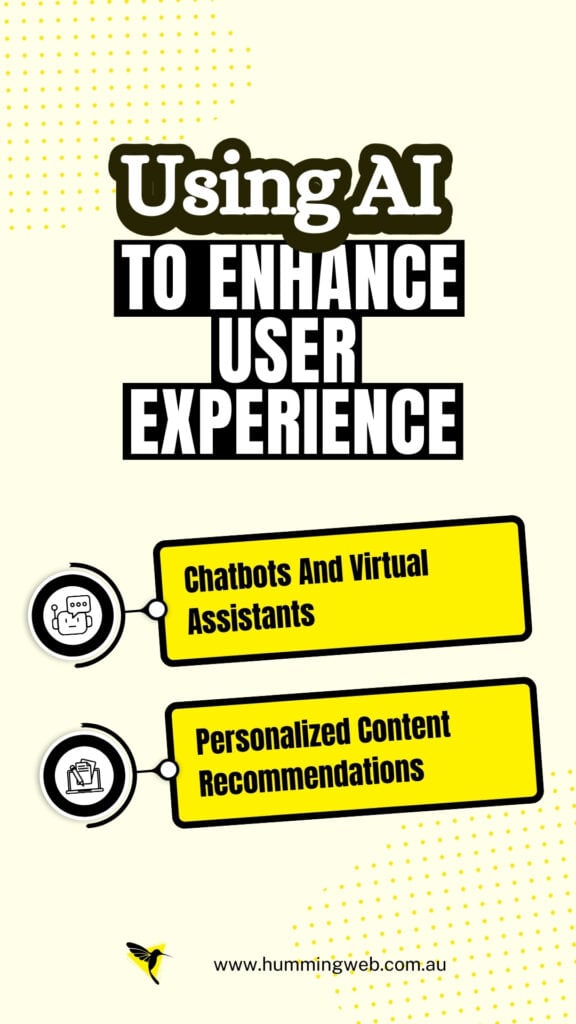Artificial Intelligence (AI) has become one of the most popular tool across various industries, and the realm of web development and content management is no exception. In this comprehensive exploration, we will delve into how AI can profoundly enhance your WordPress website in several critical aspects: user experience, content optimization, security, and analytics. By the end of this article, you’ll have a deep understanding of how AI can take your WordPress website to the next level.
1. Using AI to Enhance User Experience
UX is at the heart of any successful website. It determines whether visitors stay, engage, and ultimately convert into customers. AI can play a pivotal role in making your WordPress site more user-friendly.

A. Chatbots and Virtual Assistants
One of the most prominent and interactive ways AI can elevate the user experience is through chatbots and virtual assistants. These AI-driven tools provide instant assistance to your website visitors, emulating human-like conversation. Chatbots can be programmed to:
- Answer frequently asked questions.
- Guide users to relevant content.
- Provide support and assistance in real-time.
- Perform tasks such as scheduling appointments or processing orders.
By offering round-the-clock customer support and addressing user queries promptly, chatbots can significantly enhance user satisfaction and engagement. They provide immediate access to information and services, improving the overall user experience. The integration of chatbots into your WordPress site can be accomplished through WordPress plugin or embedding custom code. AI-driven chatbots continuously improve through machine learning, becoming more adept at handling user inquiries over time.
B. Personalized Content Recommendations
Another critical aspect of user experience enhancement is providing personalized content recommendations. AI algorithms analyze user behavior, such as pages visited, time spent on each page, and content interactions, to create user profiles. These profiles are then used to suggest relevant content to individual users. For instance, if a visitor has shown interest in specific topics, products, or services, AI can recommend related blog posts, products, or service offerings. This personalized approach keeps users engaged, encourages exploration of your website, and increases the likelihood of conversions. Implementing personalized content recommendations typically involves integrating AI-based recommendation engines into your WordPress site. These engines use collaborative filtering, content-based filtering, or hybrid approaches to suggest content that aligns with user interests.
2. Using AI Tools for Content Optimization
Maintaining high-quality, relevant, and SEO-friendly content is a constant challenge for website owners. AI can streamline content generation and optimization, making your WordPress site more efficient and effective in this regard.
A. Content Generation
AI-powered tools can significantly assist in content generation, saving you time and effort. For example:
- AI can automatically generate product descriptions, blog post summaries, or even complete articles based on predefined guidelines and data inputs.
- It can analyze vast amounts of data and generate data-driven reports, ideal for data-heavy industries like finance and analytics.
- AI can create personalized email content based on user preferences and behaviors.
This is particularly useful when you need to produce a large volume of content quickly, such as for e-commerce product listings, news websites, or data-driven reports. While AI-generated content can be a valuable resource, it’s essential to maintain a balance with human-created content to ensure authenticity and maintain your website’s unique voice. Always review AI-generated content for accuracy, relevance, and compliance with your brand guidelines before publishing.
B. SEO Optimization
AI can also significantly improve your website’s search engine optimization (SEO) efforts. AI algorithms can:
- Analyze keyword trends and suggest relevant keywords to target.
- Optimize on-page SEO elements such as meta tags, headers, and content structure.
- Provide insights into optimizing content for better search engine rankings.
AI-driven SEO tools can perform in-depth keyword research, competitor analysis, and backlink analysis, helping you create content that performs well in search results.
3. Using Artificial Intelligence to Enhancing Security of WordPress Site
Ensuring the security of your WordPress website is paramount to protect both your site and its users. AI can significantly enhance your site’s security measures.

A. Real-time Threat Detection
AI-driven security systems can monitor your website’s traffic and behavior patterns in real-time. By analyzing data from various sources, these systems can:
- Identify and block potential threats, such as spam, malware, or distributed denial-of-service (DDoS) attacks.
- Detect and respond to suspicious login attempts and brute force attacks.
- Monitor user behavior to identify anomalies and potential security breaches.
This proactive approach to security can help protect your site and its users from various online threats, providing peace of mind.
B. Fraud Detection
For e-commerce websites, AI can play a vital role in fraud detection. By analyzing transaction data and user behavior, AI can:
- Identify potentially fraudulent transactions based on patterns, such as unusual purchase quantities or locations.
- Implement multi-factor authentication for high-risk transactions.
- Flag suspicious activities, such as multiple failed login attempts or changes in user behavior.
AI-driven fraud detection systems can significantly reduce the risk of financial losses due to fraudulent transactions and protect your customers from unauthorized access to their accounts.
4. Using AI Plugin for Analytics and Data Insights
Understanding your website’s performance, user behavior, and audience preferences is essential for making informed decisions and optimizing your content and design. AI can help you gain deeper insights into your WordPress site’s analytics.
A. Advanced Analytics
AI-powered analytics tools can process vast amounts of data quickly and provide actionable insights. These tools can:
- Identify trends in user behavior and content consumption.
- Segment users based on their preferences, demographics, and behaviors.
- Offer recommendations on improving user engagement and conversion rates.
- Predict future trends and user behavior based on historical data.
For example, AI can help you understand which content performs best, which user segments are most engaged, and what factors contribute to high bounce rates. This information is invaluable for refining your content strategy and user experience.
B. Predictive Analytics
Predictive analytics, a subset of AI, can forecast future trends and user behavior based on historical data. This is particularly useful for:
- Content planning: Predictive analytics can help you anticipate which topics or products are likely to be popular in the future, allowing you to create relevant content in advance.
- Marketing strategies: By understanding customer behavior patterns, you can tailor your marketing efforts to align with their preferences and increase conversion rates.
- Inventory management: E-commerce websites can use predictive analytics to forecast product demand, optimize inventory levels, and reduce carrying costs.
Predictive analytics leverages machine learning algorithms to make data-driven predictions, enabling you to stay ahead of the curve and provide your audience with the content and products they desire.
C. A/B Testing and Optimization
AI-driven A/B testing tools can help you optimize your website design, layout, and content. A/B testing involves comparing two versions of a web page to determine which one performs better in terms of user engagement and conversion rates. AI can:
- Automatically create and test different versions of your website.
- Analyze user interactions and behavior to identify which elements, such as headlines, images, or call-to-action buttons, perform best.
This iterative approach to optimization ensures that your website is continually improving and delivering the best possible user experience.
5. Content Creation and Enhancement
Creating high-quality content consistently is a challenge for many website owners. AI can assist in content creation and enhancement in several ways:
A. Content Generation
AI-powered content generation tools can produce written content, such as articles, blog posts, and product descriptions, based on input data and predefined guidelines. These tools use natural language processing (NLP) algorithms to generate human-like text. For example, if you have an e-commerce website, AI can generate product descriptions for your products, saving you time and effort. Similarly, AI can create content summaries, reports, or even news articles for news-based websites.
B. Content Enhancement
AI can also be used to enhance existing content. For instance:
- Grammar and spelling checkers powered by AI can help ensure your content is error-free.
- AI-driven tools can suggest improvements for readability, style, and tone to make your content more engaging.
- Content optimization tools can recommend relevant keywords and phrases to improve your content’s search engine visibility.
By leveraging AI for content creation and enhancement, you can maintain a consistent flow of high-quality content while reducing the time and resources required.
Conclusion
Artificial Intelligence is a powerful tool that can revolutionize your WordPress website across various dimensions. From enhancing user experience with chatbots and personalized recommendations to streamlining content generation, improving security, and gaining deeper insights through analytics, AI has the potential to take your website to new heights.
To implement AI on your WordPress site, you can explore a range of options, from using readily available plugins to integrating third-party AI services or even custom development, depending on your specific needs and budget. However, it’s crucial to ensure that AI implementations align with your goals, user needs, and regulatory requirements, such as data privacy laws, to deliver the best possible results.
As AI continues to evolve and mature, its role in web development and content management will become even more significant. By staying informed about AI advancements and leveraging them effectively, you can maintain a competitive edge and provide your audience with an exceptional online experience. Whether you’re running a blog, e-commerce platform, news site, or any other type of WordPress website, AI has the potential to transform it for the better, driving engagement, conversions, and user satisfaction to new heights.


